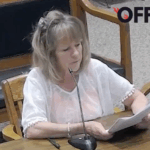
Three activists urged the Massachusetts Legislature on Tuesday to support a bill to remove potentially obscene content from school databases.
The newly introduced bill, H.2042, would remove an element of Massachusetts’ ban on disseminating obscene material to minors stating “it shall also be a defense in a prosecution under this section if the evidence proves that the defendant was a bona fide school, museum or library, or was acting in the course of his employment as an employee of such organization or of a retail outlet affiliated with and serving the educational purpose of such organization.”
That element allows teachers, museum curators, or librarians to include obscene material in their collections, as long as they are serving an educational purpose. Under the legislation, it would become illegal for teachers, museum curators, or librarians to show explicit content to minors, even if it is educational.
“Seven years ago, I started to examine the sex education curriculum that is taught throughout Massachusetts, and to say I was shocked would be an understatement,” Deedee Dorrington, one of the activists, said to the legislature.
Dorrington has been a pro-life activist since at least 2018, when she formed a group called Life Alliance to modify Massachusetts abortion laws. In 2020, she attended a protest to reopen schools during the COVID-19 pandemic.
Dorrington claimed the explicit materials she found in schools went “way beyond” what is necessary for reproductive education.
The materials included “how-to tutorials for ninth graders that detail foreplay, rimming, oral sex, and anal sex,” as well as content that “suggests that children, minors, research their porn stars so they can find out their own kink interests,” she alleged.
Another activist speaking in favor of the bill, Susan Daniels, claimed certain content in schools “provide explicit instructions on how to conduct sexual activity, in [her] view, this is an intentional attempt to indoctrinate our children and with it destroy the family.”
A third activist, Pam Videl, cited a Bible verse where Jesus defends a child from abuse before the speakers’ time in the legislative session ran out.
The bill has relatively little support, with 44 petitioners and no sponsors in the Massachusetts House. It is unlikely to pass, but may draw more attention to the part of the current law in question.
In Massachusetts, bills can be presented to the state legislature by citizens without legislative support if they gain enough signatures on a petition.
Similar attempts to change obscene content exemptions have been proposed across the country, including in Maine, Alabama and Texas.
Shawnda Hines, a spokesperson for the American Librarians Association, said that “school librarians are fearful about acquiring any book that might touch on sex or sexuality, including works that address gender identity, sexual orientation, or address abuse or sex ed – including award-winning literary works and nonfiction” as a result of these policy changes.
Click this link for the original source of this article.
Author: Kristina Watrobski
This content is courtesy of, and owned and copyrighted by, https://www.offthepress.com and its author. This content is made available by use of the public RSS feed offered by the host site and is used for educational purposes only. If you are the author or represent the host site and would like this content removed now and in the future, please contact USSANews.com using the email address in the Contact page found in the website menu.








